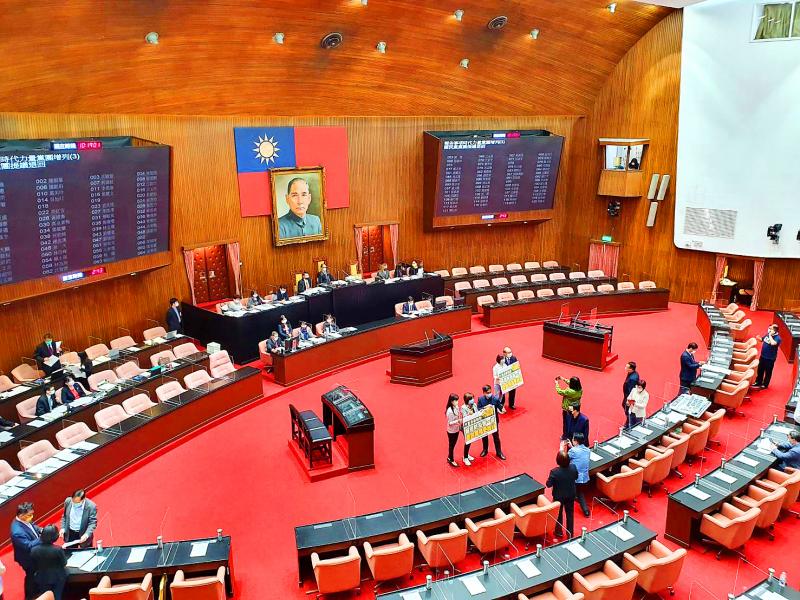Starting in Taipei today, Legislative Speaker You Si-kun (游錫堃) is visiting 19 sites that have been proposed as possible new locations for the Legislative Yuan.
You yesterday thanked the local governments, saying that he would assess the viability of each location.
The building that houses the Legislative Yuan has for years been fraught with problems, which prompted You to establish a committee that would propose a solution.

Photo: Hsieh Chun-lin, Taipei Times
All proposals are to be discussed by party representatives before a decision is reached.
Relocating the legislature might take a decade or two, but it “has to start somewhere,” You said, adding that he hopes to get opinions and professional assessments from every sector.
You and committee convener Lin Jou-min (林洲民) yesterday explained their location search-and-selection process to reporters.
Over the past 30 years, 15 locations have been proposed, You said, adding that rebuilding on the current site was one of them.
Five of the proposed locations are in Taipei: Chiang Kai-shek Memorial Hall, the 202nd Arsenal and Joint Logistics Command, Huashan 1914 Creative Park, the former Air Force Command Headquarters and the Huaguang Community, he said.
You said he welcomed four recent proposals from Taipei Mayor Ko Wen-je (柯文哲): the Taipei Military Police building, the Taipei Reserve Command, the vehicle tow yard in Wanhua District (萬華) and the Chientan Youth Activity Center.
You plans to visit the New Taipei City Government on Thursday next week, followed by the Taichung City Government, the Changhua County Government and the Yilan County Government.
You said he would keep an open mind and ask a lot of questions.
This is not the first time that moving or rebuilding the legislature has been discussed, as there was a proposal in 1990 to move the legislature to the now-defunct Huashan Station.
The proposal was passed in 1992, but then abandoned because the budget was cut by the next legislature.
In 1999, the former Air Force Command Headquarters was proposed and a special budget was passed for the project.
That plan also fell through after the Taipei City Council opposed urban development changes and disaster relief became the priority following the 921 Earthquake.

The Central Election Commission has amended election and recall regulations to require elected office candidates to provide proof that they have no Chinese citizenship, a Cabinet report said. The commission on Oct. 29 last year revised the Measures for the Permission of Family-based Residence, Long-term Residence and Settlement of People from the Mainland Area in the Taiwan Area (大陸地區人民在台灣地區依親居留長期居留或定居許可辦法), the Executive Yuan said in a report it submitted to the legislature for review. The revision requires Chinese citizens applying for permanent residency to submit notarial documents showing that they have lost their Chinese household record and have renounced — or have never

A magnitude 5.6 earthquake struck off the coast of Yilan County at 12:37pm today, with clear shaking felt across much of northern Taiwan. There were no immediate reports of damage. The epicenter of the quake was 16.9km east-southeast of Yilan County Hall offshore at a depth of 66.8km, Central Weather Administration (CWA) data showed. The maximum intensity registered at a 4 in Yilan County’s Nanao Township (南澳) on Taiwan’s seven-tier scale. Other parts of Yilan, as well as certain areas of Hualien County, Taipei, New Taipei City, Taoyuan, Hsinchu County, Taichung and Miaoli County, recorded intensities of 3. Residents of Yilan County and Taipei received

Taiwan has secured another breakthrough in fruit exports, with jujubes, dragon fruit and lychees approved for shipment to the EU, the Ministry of Agriculture said yesterday. The Animal and Plant Health Inspection Agency on Thursday received formal notification of the approval from the EU, the ministry said, adding that the decision was expected to expand Taiwanese fruit producers’ access to high-end European markets. Taiwan exported 126 tonnes of lychees last year, valued at US$1.48 million, with Japan accounting for 102 tonnes. Other export destinations included New Zealand, Hong Kong, the US and Australia, ministry data showed. Jujube exports totaled 103 tonnes, valued at

BIG SPENDERS: Foreign investors bought the most Taiwan equities since 2005, signaling confidence that an AI boom would continue to benefit chipmakers Taiwan Semiconductor Manufacturing Co’s (TSMC, 台積電) market capitalization swelled to US$2 trillion for the first time following a 4.25 percent rally in its American depositary receipts (ADR) overnight, putting the world’s biggest contract chipmaker sixth on the list of the world’s biggest companies by market capitalization, just behind Amazon.com Inc. The site CompaniesMarketcap.com ranked TSMC ahead of Saudi Aramco and Meta Platforms Inc. The Taiwanese company’s ADRs on Tuesday surged to US$385.75 on the New York Stock Exchange, as strong demand for artificial intelligence (AI) applications led to chip supply constraints and boost revenue growth to record-breaking levels. Each TSMC ADR represents